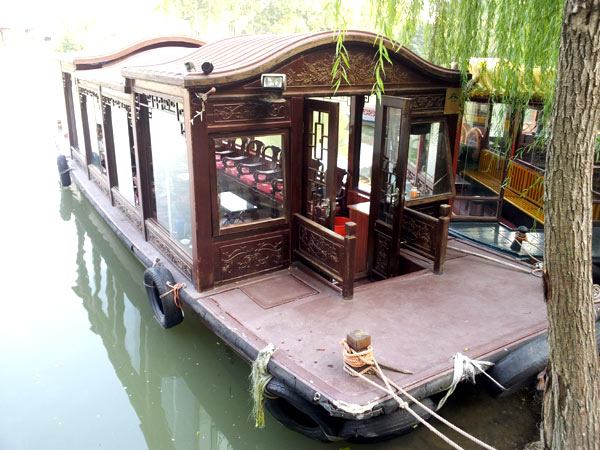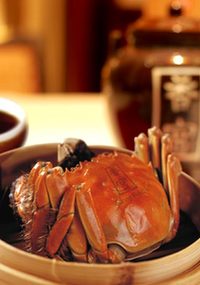A hair's breadth from utopia
 |
|
Visitors can charter a wooden houseboat to enjoy the charm of the Slender West Lake. Matt Hodges / China Daily |
However, what first got my digital palate drooling on the trip was the free WiFi in the hotel limousine.
As the two foodies of our group - for whom the term "wireless" belied an umbilical, even scary level of attachment to their iPhones - uploaded photo diaries of their breakfast on various social networking sites, I read about the perils of purchasing "fake" hairy crabs from neighboring cities.
I also learned why Yangzhou's service industries earned the nickname "three knives" (quick tip: any trip here should involve a good meal, a haircut and a pedicure).
 |
Yangzhou is not a party town, by any means, and the area we stayed in was certainly not a party part of town, unless you count the amusement park for kids nearby.
Instead, the new CBD serves as an exercise in eco-friendly urban engineering. Peace and quiet rule unchallenged. After dinner, most locals head home to play cards, and tourists can choose from among a limited list of bars or KTV parlors downtown.
Legend has it that Marco Polo served as governor here in the late 13th century under Mongol warlord Kublai Khan. In the following centuries, the city was overrun by salt and rice merchants and considered among China's wealthiest cities.
Palimpsests of this bygone era still exist in the form of certain architectural structures at the lake. Some were built in tribute to former emperors, who liked the area so much they would boat along it while holidaying in the more welcoming climate south. The lake connects to the Beijing-Hangzhou Grand Canal, which at 1,794 km is the longest canal or artificial river in the world.
The local government in Yangzhou will no doubt be rolling out a series of promotional activities next year as the city celebrates its 2,500th birthday, but if you can't wait that long, there is still a month left to enjoy its rich-tasting hairy crab. This comes from Gaoyou Lake, the sixth-largest freshwater lake in the country.
In the bling-tastic world of 21st century-China, even crabs with hairy mitts are granted designer status based on which hukou, or household registration permit, they possess. If those from Yangcheng Lake serve as the Louis Vuitton of the crustacean world, then nearby Taihu Lake crabs would be closer to Chanel, and the Gaoyou Lake variety Donna Karan.
"The most famous hairy crabs are probably those from Yangcheng Lake [just north of Suzhou], but at least here you know you are getting the real deal," Peter Chen, senior chef at the hotel's Cantonese restaurant Shang Palace, told me. Suzhou and Yangzhou are both located in Jiangsu's southern quadrant.
"It's very difficult to get authentic Yangcheng Lake crabs nowadays, even if you go there. We say they are just taking a 'shower' in the lake because so many of them are brought in from other areas," he added.
The meat of the local hairy crab is less sweet but people here say it is more succulent than its regional rivals. It is also recognizable by its slender shell and redder roe. Debate rages around whether the male or female is more delicious, but both are rich, creamy and fairly sweet.
The Shanghainese gourmands assured me the male was better, with more meat. Whereas its roe is yellow and creamy, the female's is redder and slightly richer. The male is in season in October. The female becomes flavor of the month in November. They are both cheaper here than at similar-grade restaurants in Shanghai.
We washed them down with a side dish of Zhenjiang black vinegar and ginger, complemented by Yangzhou yellow fried rice, crispy pork dipped in sugar, and a yellow soup made using soft bean curd and hairy crab roe. The local dishes were artfully prepared, colorful and not too oily.
Hairy crab may not be for everyone, however. You're going to get messy while eating it, you'll probably lose face as you make missteps along the way, and you'll need the patience of a saint if you head to table on an empty stomach. While professionals can put the shell back together intact after licking it clean, this level of skill would be comparable to an eighth-dan black belt at karate, or so it seemed to me.
Meanwhile, Conservation of Nature practically considers the species known as Eriocheir sinensis a biological terrorist, and has added it to its list of the world's worst 100 invasive alien species.
I got to sample more of the area's Huaiyang cuisine, one of China's eight regional foods, at the highly recommended Yechun Tea House, a State-run eatery that specializes in Cantonese-style buns with a local twist. The Yangzhou opera music playing inside was charming; the leg-hugging monkeys that hold you hostage outside, less so. Thirty dishes into breakfast, and with the foodies rapidly draining their camera-phone batteries, we were informed that the "main course" of assorted dumplings was ready. I think somebody made a joke about going to war.
Later, we went to Dongguan Street, a historic arcade of arts, crafts and local snacks that stretches for about 1,100 meters. You can get everything here from stuffed toys to computer keyboards made of bamboo. Some will like it; others will be underwhelmed and find some of the shops tacky or jarring amid its fortress-like setting.
That night we had drinks at The Old Brewery, a microbrewery with a Filipino band, a smattering of lonely-looking expats, and a cocktail called Baby Three Days' Sleep (75 yuan). After one of these, the band sounded better, and the foodies' inability to unplug from the Apple matrix felt like less of a threat to mankind.
As I looked at the canal through the window, I wondered if the same people responsible for the peacocks had added the gaudy neon lights to its embankment. Suddenly, I longed for the Slender West Lake. It made me appreciate the slowing of time, the quietness of centuries past - and the perfect pleasure of a quiet lakeside afternoon in China among the gingko and willow trees.
IF YOU GO
We traveled from Shanghai's Hongqiao Station to Jiangsu's Zhenjiang Station by bullet train, which took one hour, and then drove 30 minutes to the hotel.
Shangri-La Yangzhou, 472 Wenchang Xilu, Yangzhou. 0514-8512-8888.
Yechun Tea House, 10 Fengle Xiajie, Guangling district, Yangzhou. 0514-8731-5777
The Old Brewery, 128 Nantong Donglu, Guangling district, Yangzhou. 0514-8721-5225.
















